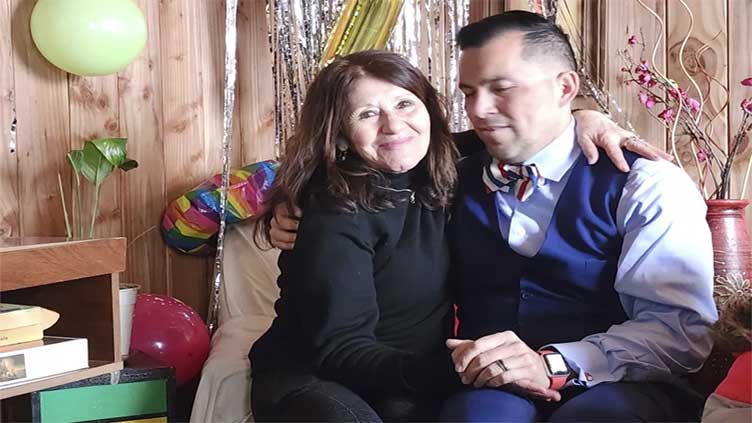Hola, Mama.”What seems like an unremarkable greeting between mother and son was in this case anything but.
Forty-two years ago, hospital workers took Maria Angelica Gonzalez’ son from her arms right after birth and later told her he had died. Now, she was meeting him face-to-face at her home in Valdivia, Chile.
“I love you very much,” Jimmy Lippert Thyden told his mother in Spanish as they embraced amid tears.
“It knocked the wind out of me. … I was suffocated by the gravity of this moment,” Thyden told The Associated Press in a video call after the reunion. “How do you hug someone in a way that makes up for 42 years of hugs?”
His journey to find the birth family he never knew began in April after he read news stories about Chilean-born adoptees who had been reunited with their birth relatives with the help of a Chilean nonprofit Nos Buscamos.
The organization found that Thyden had been born prematurely at a hospital in Santiago, Chile’s capital, and placed in an incubator. Gonzalez was told to leave the hospital, but when she returned to get her baby, she was told he had died and his body had been disposed of, according to the case file, which Thyden summarized to the AP.
“The paperwork I have for my adoption tells me I have no living relatives. And I learned in the last few months that I have a mama and I have four brothers and a sister,” Thyden said in the interview from Ashburn, Virginia, where he works as a criminal defense attorney representing “people who look like me” who cannot afford a lawyer.
He said his was a case of “counterfeit adoption.”
Nos Buscamos estimates tens of thousands of babies were taken from Chilean families in the 1970s and 1980s, based on a report from the Investigations Police of Chile which reviewed the paper passports of Chilean children who left the country and never came back.
“The real story was these kids were stolen from poor families, poor women that didn’t know. They didn’t know how to defend themselves,” said Constanza del Rio, founder and director and Nos Buscamos.
The child-trafficking coincided with many other human rights violations that took place during the 17-year reign of Gen. Augusto Pinochet, who on Sept. 11, 1973, led a Chilean coup to overthrow Marxist President Salvador Allende. During the dictatorship, at least 3,095 people were killed, according to government figures, and tens of thousands more were tortured or jailed for political reasons.
Over the past nine years, Nos Buscamos has orchestrated more than 450 reunions between adoptees and their birth families, del Rio said.
Other nonprofit organizations are doing similar work, including Hijos y Madres del Silencio in Chile and Connecting Roots in the United States.
Nos Buscamos has been partnering for two years with genealogy platform MyHeritage, which provides free at-home DNA testing kits for distribution to Chilean adoptees and suspected victims of child trafficking in Chile.
Thyden’s DNA test confirmed that he was 100% Chilean and matched him to a first cousin who also uses the MyHeritage platform.
Thyden sent the cousin his adoption papers, which included an address for his birth mother and a very common name in Chile: Maria Angelica Gonzalez.
It turns out his cousin had a Maria Angelica Gonzalez on their mother’s side and helped him make the connection.
But Gonzalez wouldn’t take his phone calls until he texted her a photo of his wife and daughters.
“Then just the dam broke,” said Thyden, who sent more photos of the American family who adopted him, his time in the U.S. Marines, his wedding, and many other memorable life moments.
“I was trying to bookend 42 years of a life taken from her. Taken from us both,” he said.
He traveled to Chile with his wife, Johannah, and their two daughters, Ebba Joy, 8, and Betty Grace, 5, to meet his newly discovered family.
Stepping into his mother’s home, Thyden was greeted with 42 colorful balloons, each one signifying a year of lost time with his Chilean family.
“There is an empowerment in popping those balloons, empowerment in being there with your family to take inventory of all that was lost,” he said.
Thyden recalls his birth mother’s response to hearing from him: “Mijo (son) you have no idea the oceans I’ve cried for you. How many nights I’ve laid awake praying that God let me live long enough to learn what happened to you.”
Gonzalez declined to be interviewed for this story.
Thyden, along with his wife and daughters visited the Santiago zoo where his American family first took him after the adoption. This time their tour guide was his biological sister.
Back at Gonzalez’ home, Thyden realized that he and his mother share a love of cooking.
“My hands are in the same dough as my mama,” he said as they made fried empanadas together. He pledged to keep using the family recipe to stay connected with his family and his culture.
Thyden said his adoptive parents are supportive of his journey to reunite with his lost relatives, but were “unwitting victims” of a far-reaching illegal adoption network and are wrestling with the realities of the situation.
“My parents wanted a family but they never wanted it like this,” he said. “Not at the extortion of another, the robbing of another.”
Through a spokesperson, his parents declined comment.
While Thyden was successfully reunited with his birth family, he recognizes that reunification might not go as well for other adoptees.
“It could have been a much worse story,” he said. “There are people who find out some really unfortunate details about their origin.”
While in Chile, Thyden and del Rio met with one of seven investigators working to address thousands of counterfeit adoption cases like his own.
“We don’t want money, we just want the human recognition that this horrible thing happened in Chile and the compromise that this is not going to continue happening in the future,” del Rio said. “We are trying to make a difference. Not only with Jimmy and his family but we want to do it, the change, in the country.”
Thyden also met with Juan Gabriel Valdes, the Chilean ambassador to the United States, to seek government recognition of the pervasiveness of the adoption scheme.
He said there was no mechanism, financial or otherwise, to assist Chilean adoptees in their efforts to visit their home country. He said he sold a truck to pay for his family’s plane tickets and other expenses.
“People need to be able to decide … what their name is going to be, where their citizenship is going to be. They should have access to both,” he said. “They should have all the rights and privileges of a Chilean citizen because this is a thing that happened to them, not that they chose.”
The Chilean Embassy in Washington did not return a request for comment.
Post Views: 59


 Sports3 months ago
Sports3 months ago
 Fashion2 months ago
Fashion2 months ago
 Sports3 months ago
Sports3 months ago
 pakistan3 months ago
pakistan3 months ago
 pakistan3 months ago
pakistan3 months ago
 World2 months ago
World2 months ago
 World2 months ago
World2 months ago
 Sports2 months ago
Sports2 months ago























